#solemnity of the most holy body and blood of christ
Text
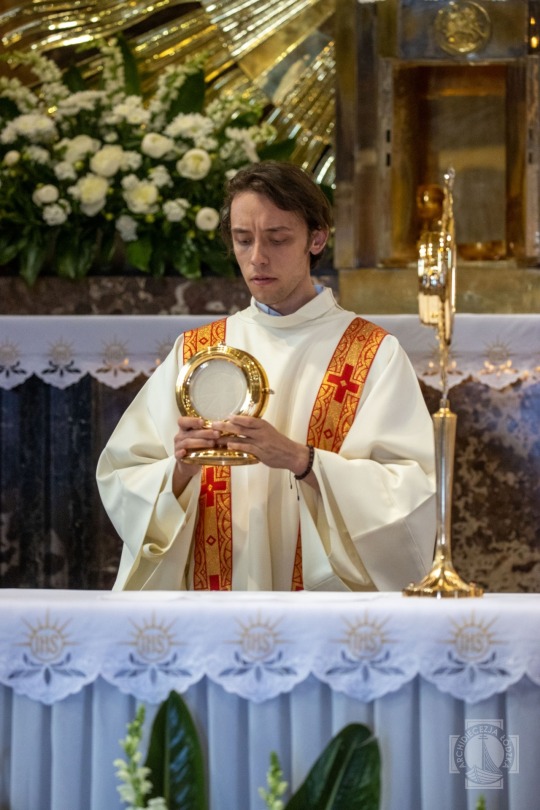
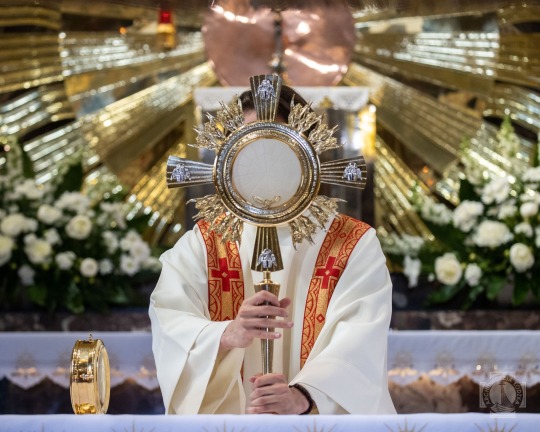
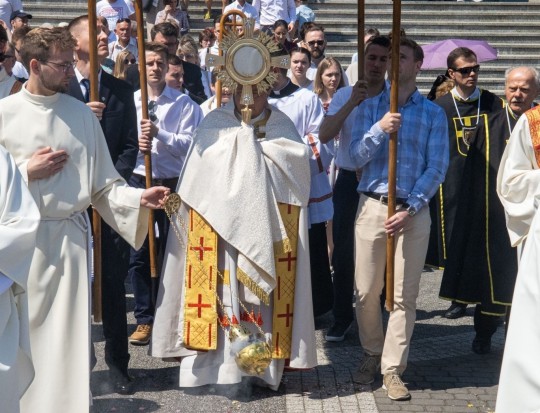
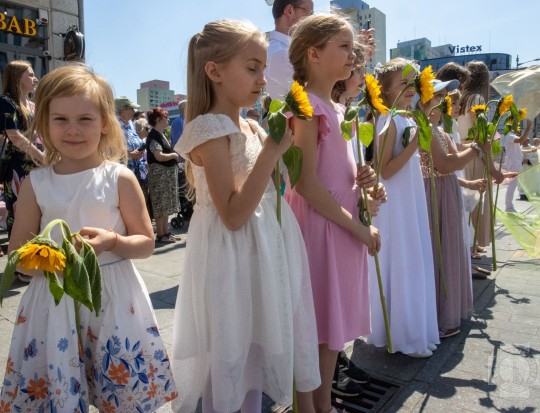

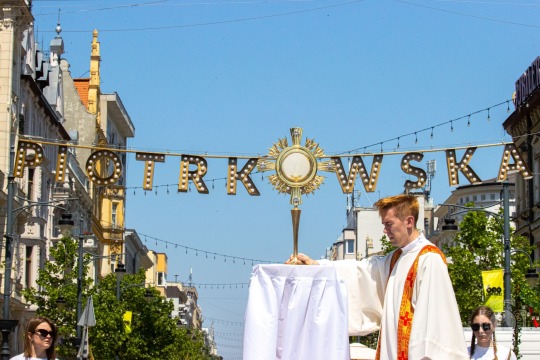

Solemnity of the Most Holy Body and Blood of Christ - Corpus Christi
© Roman Catholic Archdiocese of Łódź, Poland
#corpus christi#poland#solemnity of the most holy body and blood of christ#catholic#roman catholicism#catholic church#roman catholic#feast of corpus christi#boże ciało#christian#christianity#łódź#corpus christi procession#religion#western civilization#christ#christian faith#holy bible#polishcore#catholicism#*
30 notes
·
View notes
Text
You know when you're at a dinner party with God and things start to get...weird...? It's Maundy Thursday, and it's time for more Bible study for fans of weird queer necromancers!
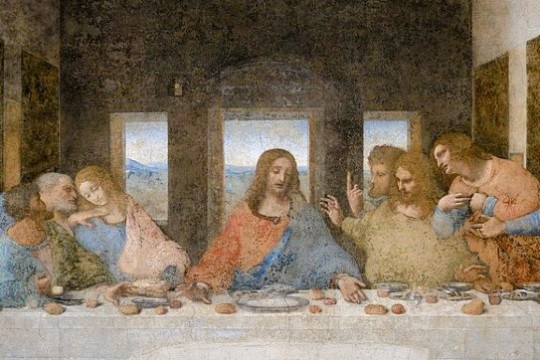
It's currently Holy Week, the week where liturgical Christians reenact the events of Jesus' death and resurrection in real time. And today, it's Maundy Thursday, which commemorates the Last Supper, where Jesus ate with his friends before he was crucified.
Before we get to the Locked Tomb, what's so special about the Last Supper?
There are actually a few significant things that happen during the Last Supper, but this is where Jesus introduces the concept of communion:
Now as they were eating, Jesus took bread, and after blessing it broke it and gave it to the disciples, and said, “Take, eat; this is my body.” And he took a cup, and when he had given thanks he gave it to them, saying, “Drink of it, all of you, for this is my blood. - Matthew 26:26-28
This isn't actually the first time Jesus has told his followers they will need to literally eat him:
So Jesus said to them, “Truly, truly, I say to you, unless you eat the flesh of the Son of Man and drink his blood, you have no life in you. Whoever feeds on my flesh and drinks my blood has eternal life, and I will raise him up on the last day. For my flesh is true food, and my blood is true drink. Whoever feeds on my flesh and drinks my blood abides in me, and I in him. - John 6:53-56
If you're thinking that sounds a bit intense, you're not alone - the Bible says that "many" of his disciples left after being told that they were apparently going to have to eat Jesus to be saved and resurrected.
While many Protestant denominations take this symbolically, Catholicism teaches transubstantiation: that when the priest prays over the bread and wine at mass, they really do become Jesus' body and blood.
With this in mind, let's circle back to necromancers:
"Overseas to Corpus. (She likes the word corpus; it sounds nice and fat.)"
This is probably Corpus Christi College, Oxford (named after the Solemnity of the Most Holy Body and Blood of Christ, where the church celebrates the real presence of Jesus in the eucharist). The symbol of the college is a pelican - there's even a fabulously gilded pelican atop the sundial in their main quad.
What do pelicans have to do with the eucharist? Quite a lot, actually... The pelican is a really old symbol for Jesus, because it was believed to feed its young on its own flesh and blood in times of famine. The pelican on the Corpus Christi sundial is pecking at its own chest.
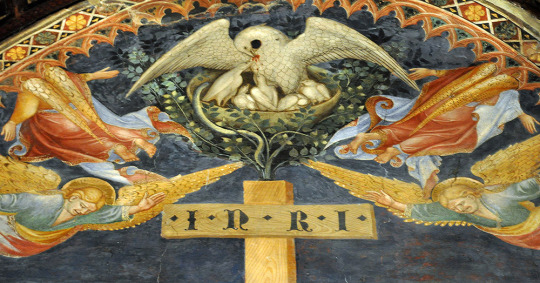
The pelican, like Jesus, was believed to give its own body to save those it loved.
Okay, so we've talked about Jesus, and weird cannibal birds, but why is this relevant to necromancers?
Specifically, the necromancer, the Necrolord Prime. John Gaius styles himself as "the god who became man", echoing Jesus as "the word became flesh". His entire pastiche of divinity is a sort of bootleg Catholicism. But while Catholicism posits Jesus' offering of his own body as foundational to the salvation and resurrection of humanity to eternal life, John's godhood relies the exploitation of other's bodies as the foundation of an empire of eternal death.
I've mentioned before in discussing Lyctorhood, how vampires have been understood to represent a sort of inversion of the eucharist because instead of consuming Christ's blood to receive eternal life in heaven, they consume other people's blood for an cursed eternal life on earth. John, and the Lyctors who followed him, gained power and eternal life from the consumption, body and soul, of another person.
In Catholic theology, Jesus offered his own body to degradation and death for the eternal salvation of humankind, but John forcibly consumes someone else's in service of his own apotheosis and immortality, dooming humanity in the process. He wants to be a Catholic flavoured god, but without the suffering that entails. But he's perfectly willing to outsource that suffering to others.
There's something just achingly awful about Alecto liking the feel of the word "corpus" - "body" - when she so hates the body that John constructed for her. John describing Alecto as "in a very real way" the mother of humanity and the mother pelican on the Corpus sundial rending her own flesh for her children. John forcing the earth into a personification of femininity and playing Jesus on another's sacrifice. His daughter, unwillingly trapped in her own corpse walking around with the wounds of her significant self-sacrifice like the resurrected Christ but yet again another body exploited by John in support of his performance of godhood. It brings to mind a very different fantastical engagement with Catholicism, where in the Lord of the Rings Tolkien - riffing on St Augustine - suggested that evil cannot create, it can only mock and corrupt. The ethics of The Locked Tomb may be messier than that, but there's something indicative in how John shies away from his creative powers - his abilities to grow plants, and manipulate earth and water - in favour of his dominion over death.
The metaphysical world of The Locked Tomb is clearly not intended to be the same as that of Catholicism. But with hindsight, perhaps John was onto something when he was surprised that he didn't "get the Antichrist bit" from the nun too.
John isn't the Antichrist. But he is, thematically, anti-Christ.
If we're talking about John and Jesus, there's also, of course, the question of Resurrection. But we've got to go through Hell and back before we get there on Sunday...
416 notes
·
View notes
Text

8th April >> Mass Readings (USA)
Solemnity of The Annunciation of the Lord
(Liturgical Colour: White. Year: B(II))
First Reading
Isaiah 7:10–14; 8:10
Behold, the virgin shall conceive.
The LORD spoke to Ahaz, saying: Ask for a sign from the LORD, your God; let it be deep as the nether world, or high as the sky! But Ahaz answered, “I will not ask! I will not tempt the LORD!” Then Isaiah said: Listen, O house of David! Is it not enough for you to weary people, must you also weary my God? Therefore the Lord himself will give you this sign: the virgin shall be with child, and bear a son, and shall name him Emmanuel, which means “God is with us!”
The Word of the Lord
R/ Thanks be to God.
Responsorial Psalm
Psalm 40:7–8a, 8b–9, 10, 11
R/ Here I am, Lord; I come to do your will.
Sacrifice or oblation you wished not,
but ears open to obedience you gave me.
Holocausts or sin-offerings you sought not;
then said I, “Behold, I come.”
R/ Here I am, Lord; I come to do your will.
“In the written scroll it is prescribed for me,
To do your will, O my God, is my delight,
and your law is within my heart!”
R/ Here I am, Lord; I come to do your will.
I announced your justice in the vast assembly;
I did not restrain my lips, as you, O LORD, know.
R/ Here I am, Lord; I come to do your will.
Your justice I kept not hid within my heart;
your faithfulness and your salvation I have spoken of;
I have made no secret of your kindness and your truth
in the vast assembly.
R/ Here I am, Lord; I come to do your will.
Second Reading
Hebrews 10:4–10
As is written of me in the scroll, behold, I come to do your will, O God.
Brothers and sisters: It is impossible that the blood of bulls and goats takes away sins. For this reason, when Christ came into the world, he said:
“Sacrifice and offering you did not desire,
but a body you prepared for me;
in holocausts and sin offerings you took no delight.
Then I said, ‘As is written of me in the scroll,
Behold, I come to do your will, O God.’”
First he says, “Sacrifices and offerings, holocausts and sin offerings, you neither desired nor delighted in.” These are offered according to the law. Then he says, “Behold, I come to do your will.” He takes away the first to establish the second. By this “will,” we have been consecrated through the offering of the Body of Jesus Christ once for all.
The Word of the Lord
R/ Thanks be to God.
Gospel Acclamation
John 1:14ab
Alleluia, alleluia.
The Word became flesh and made his dwelling among us
and we saw his glory.
Alleluia, alleluia.
Gospel
Luke 1:26–38
Behold, you will conceive in your womb and bear a son.
The angel Gabriel was sent from God to a town of Galilee called Nazareth, to a virgin betrothed to a man named Joseph, of the house of David, and the virgin’s name was Mary. And coming to her, he said, “Hail, full of grace! The Lord is with you.” But she was greatly troubled at what was said and pondered what sort of greeting this might be. Then the angel said to her, “Do not be afraid, Mary, for you have found favor with God. Behold, you will conceive in your womb and bear a son, and you shall name him Jesus. He will be great and will be called Son of the Most High, and the Lord God will give him the throne of David his father, and he will rule over the house of Jacob forever, and of his Kingdom there will be no end.” But Mary said to the angel, “How can this be, since I have no relations with a man?” And the angel said to her in reply, “The Holy Spirit will come upon you, and the power of the Most High will overshadow you. Therefore the child to be born will be called holy, the Son of God. And behold, Elizabeth, your relative, has also conceived a son in her old age, and this is the sixth month for her who was called barren; for nothing will be impossible for God.” Mary said, “Behold, I am the handmaid of the Lord. May it be done to me according to your word.” Then the angel departed from her.
The Gospel of the Lord
R/ Praise to you, Lord Jesus Christ.
3 notes
·
View notes
Text
Our Morning Offering – 11 June – Pange Lingua Gloriosi Corporis Mysterium
Our Morning Offering – 11 June – “The Month of the Sacred Heart of Jesus” – The Solemnity of Corpus Christi, The Most Holy Body and Blood of Our Lord Jesus Christ and Sunday within the Octave – The Second Sunday after Pentecost
Pange Lingua Gloriosi Corporis MysteriumSing, My TongueBy St Thomas Aquinas (1225-1274)Eng trans – Fr Edward Caswell CO (1814-1878)(Excerpt on the image – the 4 last…

View On WordPress
9 notes
·
View notes
Text
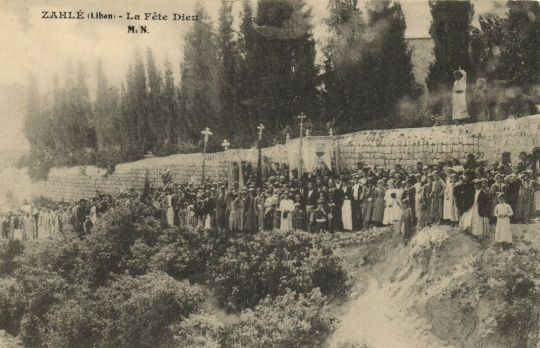
Corpus Christi, Solemnity of The Most Holy Body and Blood of Christ in Zahlé, Lebanon
French vintage postcard
#vintage#photography#postkarte#christi#french#holy#carte postale#corpus#postal#blood#christ#body#briefkaart#postcard#zahl#corpus christi#old#solemnity#photo#ansichtskarte#lebanon#sepia#zahlé#postkaart#ephemera#tarjeta#historic
5 notes
·
View notes
Text

The Solemnity of the Most Holy Trinity
Most Holy Trinity,
Father, Son and Holy Spirit,
I adore Thee profoundly.
I offer Thee the most precious Body, Blood, Soul
and Divinity of Jesus Christ,
present in all the tabernacles of the world,
in reparation for the outrages,
sacrileges and indifferences whereby He is offended.
And through the infinite merits of His Most Sacred Heart
and the Immaculate Heart of Mary,
I beg of Thee the conversion of poor sinners. Amen.
32 notes
·
View notes
Photo
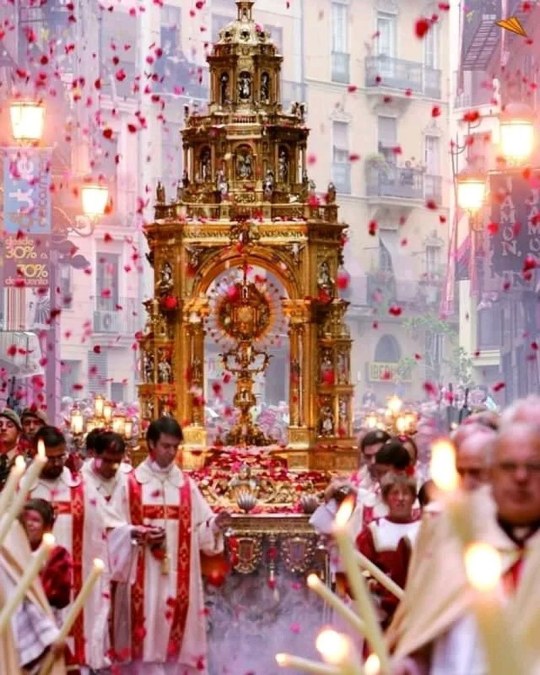
Therefore, to strengthen and exalt the Catholic Faith, we decree that, besides the daily memory that the Church makes of this Sacrament, there be celebrated a more solemn and special annual memorial. Then let the hearts and mouths of all break forth in hymns of saving joy; then let faith sing, hope dance, charity exult, devotion applaud, the choir be jubilant, and purity delight. Then let each one with willing spirit and prompt will come together, laudably fulfilling his duties, celebrating the Solemnity of so great a Feast.” –His Holiness, Pope Urban IV, “Transiturus de Hoc Mundo”
Laudetur Jesus Christus! May Our Lord Jesus Christ, in His Real Presence in the Sacrament of the Most Holy Eucharist, bless you wherever you are in the world today as you liturgically honor and celebrate this past Thursday’s Solemnity of the Most Holy Body and Blood of Christ,
10 notes
·
View notes
Video
youtube
Music for the Day:
Sequence for The Solemnity of the Most Holy Body and Blood of Christ
5 notes
·
View notes
Text
A Sermon for the Feast of Corpus Christi, Solemnity of the Most Holy Body and Blood of Christ
Fr. Troy Beecham
I suppose the first thing that I say is that this wonderful Feast a day is not commonly observed in most Episcopal Churches, though it is by the Catholic Churches and many Anglican Churches around the world.
Our celebration of the Solemnity of the Body and Blood of Christ this year takes on, perhaps, a new and deeper meaning in this unforgettable period of tyrannical enforced isolation from gathering together in person for the Holy Eucharist in 2020 and most of 2021. Before the suspension of gathered worship and participation in the Holy Eucharist, few Christians had heard or were familiar with the practice of “spiritual Communion.”
But as Christians around the world turned to online liturgies due to the ruinous suspension of gathered worship, the experience of a spiritual Communion has become a spiritual lifeline for many. Desire for the Holy Eucharist, of being nourished by the Body and Blood of Jesus, kept alive through spiritual Communion, has deepened the longing of many to physically receive Jesus, Body and Blood, in the Holy Eucharist, and exposing the absolute indifference of the majority in non-Catholic ecclesial communities and Churches.
Making spiritual Communion is a visceral reminder of the negative reality of physical isolation from the real, sacramental presence of Jesus’ body and blood at every gathering of the faithful for the celebration of the Holy Eucharist. This period has perhaps also served as a positive reminder that our desire to be nourished by God’s grace is met by Jesus’ desire to be sacramentally present to us even when we are forbidden by false pastors and bishops to receive him physically.
The Catechism of the Church calls the Holy Eucharist the “source and summit of the Christian life”. Everything in the life of the Church and of each Christian soul finds its source and fulfillment in receiving the the Body and Blood of Jesus in the celebration of the Holy Eucharist at least once a week.
St. Paul offers this explanation in the second reading for this morning, saying “The cup of blessing that we bless, is it not a sharing in the blood of Christ? The bread that we break, is it not a sharing in the body of Christ? Because there is one bread, we who are many are one body, for we all partake of the one bread.”
Receiving Jesus’ Body and Blood in the Holy Eucharist has the effect of transforming us into what we receive by the indwelling of the Holy Spirit, as St. Augustine once exhorted his community when he offered the Most Blessed Sacrament of the Body and Blood of Jesus to his congregation , “Behold what you are, may you become what you receive!”
Jesus nourishes us with his Most Blessed Body and Blood to unite us to God the Father, the Son, and the Holy Spirit, and to all others in the community of the baptized, his Body of earth, his Church. Each time we receive the the Blessed Sacrament in our celebration of the Holy Eucharist, the repeated sacrament of our life and sanctification in Jesus, we partake of and become the “living bread that came down from heaven” that Jesus is for the life of the world (Jn 6:51-58).
The Body and Blood of Jesus that we receive in the Holy Eucharist is spiritual food given with the promise of Jesus in today’s Gospel that “whoever eats my flesh and drinks my blood has eternal life.” It should fill us with “eucharistic amazement” that God desires such unity and closeness with us that he gives us the Body and Blood of Jesus his Son to eat and drink.
The Holy Eucharist is the deepest, richest spiritual reality that ultimately defies our attempts to control or regulate God’s grace, and to give it up out of fear or because of the tyranny of the faithless leaders in our midst is a terribly grace mistake to make. The wolves in sheep’s clothing in our government and in Church leadership seek to weaken us by threatening us should we dare to gather to celebrate the Holy Eucharist. The Catechism describes the Eucharist as “thanksgiving and praise to the Father,” as “the sacrificial memorial of Christ and his body”; and the ongoing presence of Jesus “in the power of his word and of his Spirit”. How could we ever allow anything lot anyone keep us from God’s presence and power to redeem and restore us? How can we ever again submit to anyone who would seek to keep us from being in communion with God?
At every celebration of the Holy Eucharist we encounter Jesus in the blessed bread and wine, in the person of the priest who acts in the person of Christ the head, in the sacred Holy Scriptures of God proclaimed, and in each other, the assembly of all the baptized gathered to worship God in faith and thanksgiving.
Today if your receiving of Jesus is through Spiritual Communion due to illness, oppression, or tyranny, pray:
“My Jesus, I believe that You are present in the Most Holy Sacrament. I love You above all things, and I desire to receive You into my soul. Since I cannot at this moment receive You sacramentally, come at least spiritually into my heart. I embrace You as if You were already there and unite myself wholly to You. Never permit me to be separated from You. Amen.”
If today you are gathered in person to celebrate the Holy Eucharist and to receive Jesus, Body and Blood, in-person, I pray that you are enfolded in the deepest joy and amazement, praying
“Eternal God, heavenly Father, you have graciously accepted us as living members of your Son our Savior Jesus Christ, and you have fed us with spiritual food in the Sacrament of his Body and Blood. Send us now into the world in peace, and grant us strength and courage to love and serve you with gladness and singleness of heart; through Jesus Christ our Lord. Amen.”
The LORD bless you and keep you, the LORD make his face to shine upon you, and be gracious to you; the LORD turn His face towards you and give you peace.
And may the peace of God, which passes all understanding, keep your hearts and minds in the knowledge and love of God, and of his Son Jesus Christ our Lord; and the blessing of God Almighty, the Father, the Son, and the Holy Spirit, be amongst you, and remain with you always. Amen.

#father troy beecham#christianity#troy beecham episcopal#jesus#father troy beecham episcopal#saints#god#salvation#peace#faith#early church#theology#new testament#holy trinity
2 notes
·
View notes
Photo

The Solemnity of the Most Holy Body and Blood of Christ is also known as the Solemnity of Corpus Christi, which translates from Latin to "Body of Christ." This feast originated in France in the midthirteenth century and was extended to the whole Church by Pope Urban IV in 1264. This feast is celebrated on the Thursday following the Trinity Sunday or, as in the USA, on the Sunday following that feast. This feast calls us to focus on two manifestations of the Body of Christ, the Holy Eucharist and the Church. The primary purpose of this feast is to focus our attention on the Eucharist. The opening prayer at Mass calls our attention to Jesus' suffering and death and our worship of Him, especially in the Eucharist. At every Mass our attention is called to the Eucharist and the Real Presence of Christ in it. The secondary focus of this feast is upon the Body of Christ as it is present in the Church. The Church is called the Body of Christ because of the intimate communion which Jesus shares with his disciples. He expresses this in the gospels by using the metaphor of a body in which He is the head. This image helps keep in focus both the unity and the diversity of the Church. The Feast of Corpus Christi is commonly used as an opportunity for public Eucharistic processions, which serves as a sign of common faith and adoration. Our worship of Jesus in His Body and Blood calls us to offer to God our Father a pledge of undivided love and an offering of ourselves to the service of others. https://www.instagram.com/p/Ce_IIPireKh/?igshid=NGJjMDIxMWI=
2 notes
·
View notes
Text
Solemnity of the Annunciation of the Lord

Readings of Monday, April 8, 2024
Reading 1
IS 7:10-14; 8:10
The LORD spoke to Ahaz, saying:
Ask for a sign from the LORD, your God;
let it be deep as the nether world, or high as the sky!
But Ahaz answered,
"I will not ask! I will not tempt the LORD!"
Then Isaiah said:
Listen, O house of David!
Is it not enough for you to weary people,
must you also weary my God?
Therefore the Lord himself will give you this sign:
the virgin shall be with child, and bear a son,
and shall name him Emmanuel,
which means "God is with us!"
Responsorial Psalm
PS 40:7-8A, 8B-9, 10, 11
R./ Here I am, Lord; I come to do your will.
Sacrifice or oblation you wished not,
but ears open to obedience you gave me.
Holocausts or sin-offerings you sought not;
then said I, "Behold I come."
R./ Here I am, Lord; I come to do your will.
"In the written scroll it is prescribed for me,
To do your will, O my God, is my delight,
and your law is within my heart!"
R./ Here I am, Lord; I come to do your will.
I announced your justice in the vast assembly;
I did not restrain my lips, as you, O LORD, know.
R./ Here I am, Lord; I come to do your will.
Your justice I kept not hid within my heart;
your faithfulness and your salvation I have spoken of;
I have made no secret of your kindness and your truth
in the vast assembly.
R./ Here I am, Lord; I come to do your will.
Reading 2
HEB 10:4-10
Brothers and sisters:
It is impossible that the blood of bulls and goats
take away sins.
For this reason, when Christ came into the world, he said:
"Sacrifice and offering you did not desire,
but a body you prepared for me;
in holocausts and sin offerings you took no delight.
Then I said, 'As is written of me in the scroll,
behold, I come to do your will, O God.'"
First he says, "Sacrifices and offerings,
holocausts and sin offerings,
you neither desired nor delighted in."
These are offered according to the law.
Then he says, "Behold, I come to do your will."
He takes away the first to establish the second.
By this "will," we have been consecrated
through the offering of the Body of Jesus Christ once for all.
Gospel
LK 1:26-38
The angel Gabriel was sent from God
to a town of Galilee called Nazareth,
to a virgin betrothed to a man named Joseph,
of the house of David,
and the virgin's name was Mary.
And coming to her, he said,
"Hail, full of grace! The Lord is with you."
But she was greatly troubled at what was said
and pondered what sort of greeting this might be.
Then the angel said to her,
"Do not be afraid, Mary,
for you have found favor with God.
Behold, you will conceive in your womb and bear a son,
and you shall name him Jesus.
He will be great and will be called Son of the Most High,
and the Lord God will give him the throne of David his father,
and he will rule over the house of Jacob forever,
and of his Kingdom there will be no end."
But Mary said to the angel,
"How can this be,
since I have no relations with a man?"
And the angel said to her in reply,
"The Holy Spirit will come upon you,
and the power of the Most High will overshadow you.
Therefore the child to be born
will be called holy, the Son of God.
And behold, Elizabeth, your relative,
has also conceived a son in her old age,
and this is the sixth month for her who was called barren;
for nothing will be impossible for God."
Mary said, "Behold, I am the handmaid of the Lord.
May it be done to me according to your word."
Then the angel departed from her.
0 notes
Text
A Special Announcement!!
During the Apparition to Marija yesterday,
Our Lady asked Marija to invite us all
to meet on Apparition Hill today,
January 1, 2024,
to pray together with Marija
from 3:00pm until 6:00pm.
Mary TV will live stream this time of prayer!
Join us at www.marytv.tv
January 1, 2024
Solemnity of Mary, the Holy Mother of God
Dear Family of Mary!
Today we honor and praise Our Lady, Mary the Mother of God! The Father chose her from all of creation to be the Mother of His Son, Jesus. We cannot fathom the wonder of Mary, chosen to be the Mother of Christ. But we can contemplate it. It is very helpful for us to allow the Holy Spirit to expand our minds to begin the glimmer this heavenly reality.
Here is a short explanation from Magnificat that is very good for us to ponder:
The Greatness of the Mother of God
Our Lady is the Mother of God because Jesus Christ who was born of her is God. To Jesus Christ she gave what every mother gives to the child that is born of her, and for which she is called the child’s mother. Our Lady is the Mother of God just as truly, as fully, as literally, and exactly as every other mother is the mother of her child. By reason of her divine motherhood and the special relation in which this places her to the Blessed Trinity, Our Lady was necessarily a creature apart and unique from the very first moment of her existence. To make her worthy of her marvelous destiny in every way, God so created her soul that from the first instant of its existence it was filled with grace. Our Lady then, by this special intervention of God, applying to her by anticipation the merits of the Passion yet to come, was conceived untouched by the sinful legacy of the Fall.
As Our Lady was thus unique in her creation in grace, so is her place and role unique in the glory of heaven. Thanks to her actual kinship with God according to his human nature, there is a union between Our Lady and God that no other saint can come to, and because of this union her power of intercession is unique. So much so that it is the common teaching of theologians that God has so disposed things that whatever graces are granted to mankind are granted through Our Lady’s intercession….
We do not adore Our Lady, but the honor we give her is greater than the honor we give the saints. “The Blessed Virgin,” says Saint Thomas Aquinas, “from the fact that she is the Mother of God, derives a dignity that is in a way infinite from the infinite good that is God. And in this sense just as there cannot exist anything better than God so there could not be made anything better than herself.” Between this most glorious of all God’s creatures and the rest of us there is moreover this special link: In a very real sense, she is the Mother of us all. For Our Lady is the Mother of him whom Holy Scripture calls the firstborn among many brethren (Rom 8:29). And he, when dying, giving her to be the Mother of the beloved disciple Saint John, foretold and created her role as Mother of all Christians. Such are the reasons and the origin of the immense place Our Lady occupies in the daily life of every Catholic.
- Monsignor Philip Hughes (Magnificat - January 2024)
And here is a message from Our Lady in which she shared about her motherhood with Mirjana:
February 2, 2020 "Dear children, by the act of the decision and love of God, I am chosen to be the Mother of God and your mother. But also by my will and my immeasurable love for the Heavenly Father and my complete trust in Him, my body was the chalice of the God-man. I was in the service of truth, love and salvation, as I am now among you to call you, my children, apostles of my love, to be carriers of truth; to call you to spread His words, the words of salvation, by your will and love for my Son: that with your actions you may show, to all those who have not come to know my Son, His love. You will find strength in the Eucharist - my Son who feeds you with His Body and strengthens you with His Blood. My children, fold your hands [in prayer] and look at the Cross in silence. In this way, you are drawing faith to be able to transmit it; you are drawing truth to be able to discern; you are drawing love that you may know to love truly. My children, apostles of my love, fold your hands [in prayer], look at the Cross. Only in the Cross is salvation. Thank you."
I know this is a lot to read, but on this day, we can give Our Lady the time it takes, to get to know her better! She is Our Mother too!! God bless! And don't forget to join us on Apparition Hill today at 3:00 pm Medjugorje time to pray with our Mother!!!
(Our Daily Rosary with Denis and Cathy will be live at 2:00 pm Medj time today)
In Jesus, Mary, and Joseph!
Cathy Nolan
(c) Mary TV 2024
Mary TV. Inc. | www.marytv.tv

0 notes
Text
Portable Communion Sets
"The Significance and Convenience of Portable Communion Sets"
Introduction
Communion, a sacred and symbolic act for Christians, holds a central place in their faith. It is a practice that brings believers together to remember the life and sacrifice of Jesus Christ. Whether it's celebrated in a grand cathedral, a small chapel, or even in the privacy of one's home, the act of communion is a solemn and deeply personal experience. In recent years, the way communion is conducted has seen a transformation with the advent of portable communion sets. These sets offer convenience and flexibility, making it possible to partake in this holy sacrament virtually anywhere. This article delves into the significance and convenience of portable communion sets, exploring their history, components, benefits, and their role in contemporary Christian worship.
The History of Portable Communion Sets
To understand the significance of portable communion sets, it is essential to explore their historical roots. Communion, often referred to as the Eucharist or the Lord's Supper, has been practiced in Christianity since the time of Jesus Christ. It was during the Last Supper that Jesus shared bread and wine with His disciples, symbolizing His body and blood, and instructed them to continue this practice in remembrance of Him.
In the early centuries of Christianity, the observance of communion was simple and integral to communal gatherings. It involved bread, wine, and a common cup. However, as the Church grew and spread across the world, practical challenges emerged. In many cases, it became inconvenient or impractical to carry out the traditional form of communion, particularly in times of persecution, travel, or during mission work.
The first known portable communion set, or "traveling mass kit," dates back to the early Christian Church. These kits were initially designed to serve the needs of itinerant clergy, missionaries, and travelers who wanted to maintain their faith while on the move. Such sets typically contained small containers for bread and wine, as well as a chalice or cup for the serving of the elements.
With the passage of time and the diversification of Christian denominations, various portable communion set designs emerged. Each denomination adapted the concept to meet its specific liturgical needs and preferences. Today, portable communion sets are available in a wide range of styles and sizes, serving the unique requirements of different Christian traditions.
Components of Portable Communion Sets
Portable communion sets consist of several essential components, each designed to fulfill a specific role in the sacred act of communion. While the specific details may vary based on denominational preferences, the following are common components found in most sets:
Container: The container, often made of durable materials like metal, plastic, or wood, holds all the communion elements and keeps them secure during transport.
Bread Compartment: This compartment holds the bread or wafers used for the body of Christ. It is typically a small, airtight container that ensures the elements remain fresh.
Wine Compartment: Similar to the bread compartment, the wine compartment securely holds the consecrated wine or grape juice.
Chalice or Cup: A small cup or chalice is used for the distribution of the wine or grape juice during the communion service.
Lid and Cover: The lid and cover of the set serve to protect the contents from dust and contamination while maintaining a reverent atmosphere.
Utensils: Some sets include a small spoon or tongs for handling the bread and administering the elements.
Benefits of Portable Communion Sets
Portable communion sets offer numerous advantages for both clergy and congregations. These benefits have contributed to the increased popularity of such sets in contemporary Christian worship:
Mobility and Convenience: Portable communion sets are lightweight and compact, making them easy to transport to various locations. This convenience is especially valuable for clergy, missionaries, hospital chaplains, and individuals who wish to observe communion outside of traditional church settings.
Ensured Freshness: The airtight containers within these sets help preserve the freshness and integrity of the communion elements, ensuring that they remain suitable for sacred use over extended periods.
Inclusivity: Portable sets enable the celebration of communion in diverse settings, promoting inclusivity and allowing for a wider range of people to participate in this essential sacrament.
Flexibility: As mentioned earlier, portable communion sets are adapted to suit the liturgical traditions and practices of various denominations. This adaptability ensures that each congregation can maintain its specific worship style while still benefiting from the convenience of a portable set.
Crisis and Emergency Situations: In times of crisis, such as natural disasters or pandemics, portable communion sets can be vital for offering spiritual support to individuals when traditional church services are not feasible.
Private and Family Use: Portable sets have found a place in private and family worship. Many individuals and families now use these sets to partake in communion within the comfort of their homes, fostering a more intimate and reflective spiritual experience.
Contemporary Use and Relevance
In today's ever-evolving world, the significance and convenience of portable communion sets have made them more relevant than ever. They have expanded beyond their original purpose of serving traveling clergy to become an essential tool for modern Christian worship. Their use in various contexts highlights their enduring significance:
Missionary Work: Missionaries, who often operate in remote or challenging locations, rely on portable communion sets to maintain their faith practices and provide spiritual support to communities around the world.
Hospitals and Care Facilities: Hospital chaplains use portable sets to offer communion to patients, providing comfort and solace in times of illness and distress.
Home Communion: As more Christians embrace the idea of home worship and small-group gatherings, portable sets have become a way for individuals and families to participate in communion without the need for a traditional church service.
Outdoor Services: Churches and congregations holding open-air services or special events can use portable sets to ensure that communion remains an integral part of their worship.
Conclusion
The history, components, and benefits of portable communion sets reveal their immense significance and convenience for modern Christian worship. These sets, originally designed to meet the needs of traveling clergy, have evolved to cater to the diverse requirements of today's Christian community. They offer mobility, inclusivity, freshness, and flexibility, allowing for the observance of communion in various contexts and settings. In times of crisis, they provide a means of spiritual support, and in the context of home worship and smaller gatherings, they enable a more personal and reflective communion experience.
Portable communion sets bridge the gap between tradition and modernity, ensuring that the essence of the Eucharist remains accessible to all who seek to partake in this sacred and symbolic act of remembrance. As the world continues to change, these sets stand as a testament to the enduring nature of faith and the ability of believers to adapt and innovate, while always keeping the core of their beliefs intact.
1 note
·
View note
Text

8th April >> Mass Readings (Except USA)
Solemnity of The Annunciation of the Lord
(Liturgical Colour: White. Year: B(II))
First Reading
Isaiah 7:10-14,8:10
The maiden is with child.
The Lord spoke to Ahaz and said, ‘Ask the Lord your God for a sign for yourself coming either from the depths of Sheol or from the heights above.’ ‘No,’ Ahaz answered ‘I will not put the Lord to the test.’
Then Isaiah said:
‘Listen now, House of David:
are you not satisfied with trying the patience of men
without trying the patience of my God, too?
The Lord himself, therefore,
will give you a sign.
It is this: the maiden is with child
and will soon give birth to a son
whom she will call Immanuel,
a name which means “God-is-with-us.”’
The Word of the Lord
R/ Thanks be to God.
Responsorial Psalm
Psalm 39(40):7-11
R/ Here I am, Lord! I come to do your will.
You do not ask for sacrifice and offerings,
but an open ear.
You do not ask for holocaust and victim.
Instead, here am I.
R/ Here I am, Lord! I come to do your will.
In the scroll of the book it stands written
that I should do your will.
My God, I delight in your law
in the depth of my heart.
R/ Here I am, Lord! I come to do your will.
Your justice I have proclaimed
in the great assembly.
My lips I have not sealed;
you know it, O Lord.
R/ Here I am, Lord! I come to do your will.
I have not hidden your justice in my heart
but declared your faithful help.
I have not hidden your love and your truth
from the great assembly.
R/ Here I am, Lord! I come to do your will.
Second Reading
Hebrews 10:4-10
God's will was for us to be made holy by the offering of his body made once and for all by Jesus Christ.
Bulls’ blood and goats’ blood are useless for taking away sins, and this is what Christ said, on coming into the world:
You who wanted no sacrifice or oblation,
prepared a body for me.
You took no pleasure in holocausts or sacrifices for sin;
then I said,
just as I was commanded in the scroll of the book,
‘God, here I am! I am coming to obey your will.’
Notice that he says first: You did not want what the Law lays down as the things to be offered, that is: the sacrifices, the oblations, the holocausts and the sacrifices for sin, and you took no pleasure in them; and then he says: Here I am! I am coming to obey your will. He is abolishing the first sort to replace it with the second. And this will was for us to be made holy by the offering of his body made once and for all by Jesus Christ.
The Word of the Lord
R/ Thanks be to God.
Gospel Acclamation
John 1:14
Alleluia, alleluia!
The Word became flesh,
he lived among us,
and we saw his glory.
Alleluia!
Gospel
Luke 1:26-38
'I am the handmaid of the Lord'.
The angel Gabriel was sent by God to a town in Galilee called Nazareth, to a virgin betrothed to a man named Joseph, of the House of David; and the virgin’s name was Mary. He went in and said to her, ‘Rejoice, so highly favoured! The Lord is with you.’ She was deeply disturbed by these words and asked herself what this greeting could mean, but the angel said to her, ‘Mary, do not be afraid; you have won God’s favour. Listen! You are to conceive and bear a son, and you must name him Jesus. He will be great and will be called Son of the Most High. The Lord God will give him the throne of his ancestor David; he will rule over the House of Jacob for ever and his reign will have no end.’ Mary said to the angel, ‘But how can this come about, since I am a virgin?’ ‘The Holy Spirit will come upon you’ the angel answered ‘and the power of the Most High will cover you with its shadow. And so the child will be holy and will be called Son of God. Know this too: your kinswoman Elizabeth has, in her old age, herself conceived a son, and she whom people called barren is now in her sixth month, for nothing is impossible to God.’ ‘I am the handmaid of the Lord,’ said Mary ‘let what you have said be done to me.’ And the angel left her.
The Gospel of the Lord
R/ Praise to you, Lord Jesus Christ.
2 notes
·
View notes
Text
Corpus Christi, Notre-Dame du Dimanche/ Our Lady of Sunday, France (1873) and Memorials of the Saints - 8 June 2023
Corpus ChristiThe Feast is liturgically celebrated on the Thursday after Trinity Sunday or, “where the Solemnity of The Most Holy Body and Blood of Christ is not a Holy Day of Obligation, it is assigned to the Sunday after the Most Holy Trinity, as its proper day.”(Sanctissimi Corpus et Sanguis Christi.)
Notre-Dame du Dimanche/ Our Lady of Sunday, Saint-Bauzille-de-la-Sylve, l’Hérault, France…
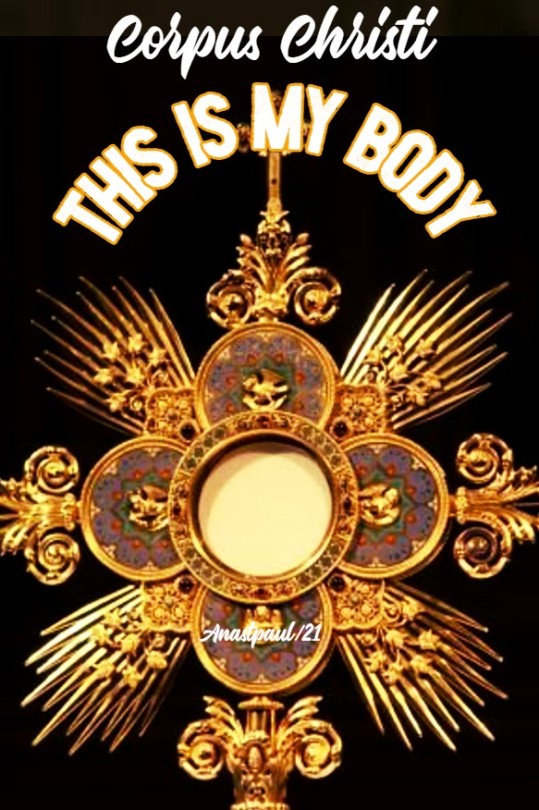
View On WordPress
#corpuschristi#ourladyofsunday#saints8june#stgildardofrouen#stmaximinusofaix#stmedard#stwilliamofyork
9 notes
·
View notes
Text
Solemnity of the Most Holy Body and Blood of Christ
1st Reading: Deuteronomy 8:2-3, 14b-16a – Moses tells the people to remember how God delivered them from slavery in Egypt.
Responsorial Psalm: Psalm 147:12-15, 19-20 – Praise God, Jerusalem!
2nd Reading: 1 Corinthians 10:16-17 – Though many, we are one body when we partake of the Body and Blood of Christ.
Gospel Reading: John 6:51-58 – Jesus says, “I am the living bread.”
Personal…

View On WordPress
0 notes